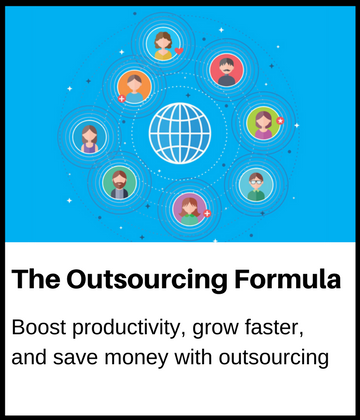In an interview on his blog, billionaire and founder of the Virgin companies Sir Richard Branson said the following about Steve Jobs:
“I admired Steve Jobs, although he was completely different from me. He used to shout at employees that made mistakes. He did not delegate much, and broke all the rules I believe in. Somehow it worked for him. Apple is one the best brands in the world.”
Branson, on the other hand, delegates a ton; how else could he manage nearly 50 companies at once?
Now, I’m not saying that Jobs’ management style was any better than Branson’s or vice versa. But clearly, even Jobs delegated a ton of business activities. For instance, Jobs clearly didn’t’ do Apple’s bookkeeping.
Both Branson and Jobs are/were masters at delegating activities. Which allowed them to focus on the highest value uses of their time to building their companies.
But a natural question arises for entrepreneurs with regards to delegating. And that is: what should I delegate or outsource? [From a definition standpoint, I consider “delegating” to be giving a task to someone else within your organization and “outsourcing” to be giving a task to someone outside your organization.]
This question is particularly acute if/when you are an earlier stage entrepreneur with limited resources (versus Apple and Virgin who are billion dollar companies).
If you look at your business, there is probably a very long list of activities you could delegate, or rather (particularly if your company is relatively small) outsource.
For example, you might outsource activities related to:
- generating new leads
- computer and IT infrastructure
- bookkeeping
- new product or service development
In addition to outsourcing tasks like these, you may simply choose to outsource tasks that are just plain annoying or take up a lot of your time.
But, once again, if you’re working with a limited budget, you will have to make some difficult decisions about what to outsource, and what to outsource now versus later.
Preparing to Outsource
Even if you had unlimited funds, you would still want to prioritize what you outsource and when. This is because each task, role, or responsibility you give to someone else requires work. There is time required to plan the task, find and train the individual, and support or coach them among others.
For example, if you want to hire someone to call local businesses and set appointments for you, you would need to:
- Develop a general game plan of who to call, how many people, what times of day, and for what purpose.
- Create a list of people to call, or develop parameters for the individual to use to develop their own list.
- Write a script the individual should follow when making calls.
- Create a list of the most frequently asked questions or concerns, to orient the individual on your product or service and what you can do for customers.
As you can see, simply preparing to outsource a task takes times, so you can’t outsource everything.
What to Outsource First
Every business is different and only you can determine what to outsource. However, read the following to see examples, rules and guidelines that I and other successful entrepreneurs have found to be effective.
Task Type #1: Lead Generation Tasks
Since the biggest challenge of most businesses is not having enough leads no matter how great your product or service, lead generation is probably one of the first things I would outsource if you want to make more money. This is particularly true if you think that your investment in outsourcing can be returned very quickly in the form of new sales and profits.
You should specifically consider outsourcing lead generation tasks that you don’t already do, or that you do poorly or ok (but not great).
For example, search engine optimization (SEO) is a lead generation task that most entrepreneurs don’t do, or do very poorly because they don’t have the time to devote to it. Conversely, some search engine optimization firms and outsourced individuals stay abreast of the latest SEO techniques and technologies and can generate significantly greater results than you or your team can in a fraction of the time or cost.
Task Type #2: Fulfilling the business you generate
Once you generate leads and convert them into clients, you need to fulfill the orders. Particularly in service businesses, fulfillment often becomes a bottleneck; particularly if you need to perform the work yourself.
This typically results in a “feast or famine” cycle. That is, once you close a new client you are in “feast” mode from the money the new client brings in. But then, you spend all your time fulfilling the client, and when the work ends you are in famine mode. Specifically, because while fulfilling you didn’t spend time on additional lead generation, once the client job ends, you are left without enough revenues and searching for new clients.
So considering putting someone in place to handle all the new business to generate. If not, you’ll likely find your lead generation to be sporadic and less effective, or your customers not getting the quality of service they deserve.
Task Type #3: Other ongoing, repetitive tasks
There are many tasks your business needs to perform over and over again-like bookkeeping, filing, creating reports, compiling data and contact lists into spreadsheets, researching vendors, etc.
Your job is to grow your business by initiating new projects, not taking care of business as usual. So you need to outsource these administrative tasks.
Task Type #4: Your most painful tasks
Each of us has our favorite tasks and our most dreaded tasks. And each of us has strengths and weaknesses. Ideally, you should perform the tasks which 1) you like, 2) which leverage your strengths, and 3) which have the most value to your organization.
And certainly, if a task doesn’t meet any of these three criteria, you must outsource it immediately.
The exception to this (and a warning) is when there is a skill or competency that you really do need to improve in order to be a successful business owner. Decision-making, planning, building a team, and other leadership responsibilities are not always fun, but critical to perform yourself (or with a co-founder or management team if necessary).
Action Plan to get started
With these thoughts in mind, create a list of tasks that you are doing right now that aren’t the highest value uses of your time. Also include tasks you aren’t doing (e.g., lead generation tactics), but should in order to boost revenues and profits.
I realize there often seems to be a chicken-and-egg issue, which is that you need money to outsource projects, but if you spend your time doing those projects yourself, you won’t generate enough revenues or profits to pay for an outsourced person.
The answer is to take the leap. Go ahead and outsource a task or two. You will inevitably find you can generate more revenues and profits with the time you gain from outsourcing. You will eventually start outsourcing (and delegating) more and grow a thriving company.
So make a quick list of the 5-10 activities you should outsource (either because they are a pain, you are not doing but need to do them, or they are low-level repetitive tasks). And then find someone to which you can outsource them.
The Outsourcing Formula
In today’s competitive business environment you can’t afford to 1) pay top dollar for generic resources or 2) take too long to complete projects. What is the solution to avoid both: outsourcing!
In our Outsourcing Formula training program you’ll learn how to inexpensively build a highly productive remote team.



